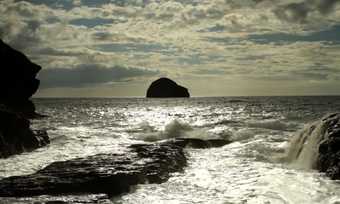Kodwo Eshun and Anjalika Sagar’s Hydra Decapita is an Afrofuturist sonic fiction on the art of darkness. It meditates on the afterlife of transatlantic slavery in the British Empire
The film takes as its starting point the Detroit electronic group Drexciya’s mythos of a subaquatic mutant Black world. From 1993 until 2002, James Stimson and Gerald Donald produced music set in an underwater kingdom. It was populated by Drexciyans, who were descended from the amphibious babies of pregnant African women thrown overboard from slave ships crossing the Atlantic. Hydra Decapita turns Drexciya’s powerful reimagining of this Middle Passage towards an encounter with the words of art critic John Ruskin and JMW Turner’s visual reckoning with the irreparable evil of British slavery.
Over several days in November and December 1781, more than 132 African women, men and children, handcuffed and in irons, were pushed overboard into the Caribbean Sea by the crew of the British slave ship Zong. Messrs Gregson, the Zong’s Liverpool-based owners, claimed marine insurance for the ‘loss’ of their captives. The insurers, Messrs Gilbert, refused to pay. On 6 March 1783, the jury at the Court of King’s Bench, Guildhall, ordered Gilbert to compensate Gregson.
Although the case of the Zong provided an inspiration for JMW Turner’s Slave Ship (Slavers Throwing Overboard the Dead and Dying – Typhon Coming On) 1840, Turner’s painting does not portray the aftermath of the Zong murder. In actuality, no images of the Zong existed. Hydra Decapita takes the missing image of the Zong as the vanishing point from which to visit Ruskin’s celebrated analysis of Turner’s painting in Modern Painters Vol. 1 1843. By voicing Ruskin’s text in counterpoint with Gerald Donald’s thoughts on what he calls ‘interhydratic’ travel, the film invites audiences to tune themselves into the radical imagination of a Black future.
Film schedule
10.15–10.47
10.50–11.22
11.25–11.57
12.00–12.32
12.35–13.07
13.10–13.42
13.45–14.17
14.20–14.52
14.55–15.27
15.30–14.02
16.05–16.37
16.40–17.12
17.15–17.47
35 minutes approx.
Tate Britain

